Iman Al Sherbini, Mohammed Bassiki, Abdullah Mohamed, Ahmed Haj Hamdo, Ali Al Ibrahim (Siraj), Mahmoud Naffakh, and Derek Thomson (The France 24 Observers), Anna Bonario (Rise Project).

In January 2022, the authorities of the port of Misrata detained the East Express ship with ten Syrians, one Egyptian, and one Indian on board. (East Express ship crew)
After spending five months working as sailors aboard the “East Express” ship, the young Syrian, Ammar Al-Sheikh, did not expect this to be his last journey.
On January 16, 2022, Libyan authorities detained the carrier and prevented its crew of 11 sailors from disembarking at the Misrata port, claiming that the cargo of sugar coming from Turkey was “unsuitable for human consumption.” As such, they remained stranded on board.
“When our ship docked at the port of Misrata, Libyan authorities searched the sugar shipment in our possession. During the inspection, inspectors reported that the sugar had spoiled (it was unsuitable for human consumption), and issued an order to detain it,” said Al Sheikh to the investigative team.
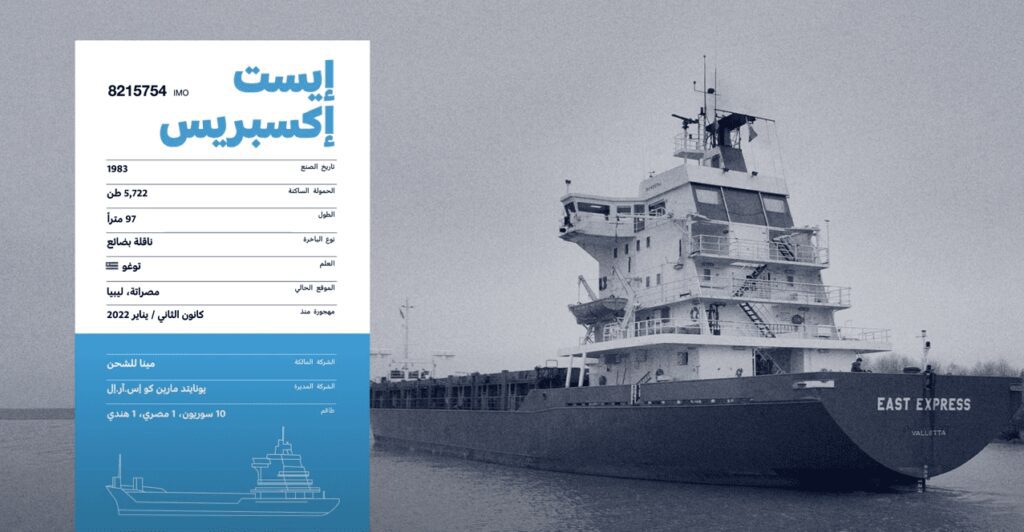

The East Express is a cargo ship, built in the 1980s, specifically in 1983, with a length of 97 meters, capable of carrying more than 5,700 tons of goods, fuel, and gravel.
The ship is registered in Togo in West Africa, owned by Mina Shipping, and operated by the United Marine Co., S.R., both registered in Romania, according to the available data on the Marine Traffic and EQUASIS websites.
With fuel running out and electricity cut off from the ship, living aboard became unbearable. Ammar and the crew members who started working aboard in 2022 tried to find a solution. They thought of communicating with its management, and considering that they didn’t know exactly who owned the ship, their situation worsened. The crew felt “abandoned,” and here began the journey of suffering they hadn’t accounted for.
“The company completely abandoned us. We have no food, no water, no salaries!” Al Sheikh said in a video sent to the investigative team in September 2023.
“For me, ‘abandonment’ means that we are in need of food, drinks, and daily necessities, because we cannot get them from the ship’s managers and owners,” he added.
The crew of the ship, composed of ten Syrian sailors and one holding Egyptian nationality, has not received any of their dues since January 2023. Most of them believe that staying on board the ship is the only way to get their money.
Last September, Al Sheikh sent a series of videos and photos illustrating the situation on board of the ship: electricity was cut off and there was a severe shortage of food and medical supplies, as well as empty shelves and refrigerators which were sufficient to supply a group of people with the necessary provisions. The crew was also prevented from disembarking from the ship.


Shelves of food for the crew are empty aboard the ship East Express.
Over a period of six months, a team of investigative journalists from the Syrian Investigative Journalism Unit – Siraj, in collaboration with The France 24 Observers, attempted to uncover more cases of abandoned ships at sea, where Syrian sailors and technicians found themselves living on abandoned aboard ships left at port docks without food, drink, or wages.
The fate of the East Express crew is just one of 1267 similar cases of sailors, including Syrians, abandoned on docks far from their homelands or at sea during the year 2023. The total number of abandoned ships during the same period reached 81 ships according to Rightship, an organization concerned with seafarers’ affairs.
When we first contacted the crew of the East Express ship, all crew members were unaware of the true identity of the ship’s owner.
In the first part of our investigation, we uncover intricate networks of dummy companies that allow ships to continue maritime transportation activities and evade all forms of legal accountability, with it being sufficient for you to have one registered company allowing its owner to manage a ship.
The investigative team also discovered methodologies followed by ship owners to support their decisions to abandon ships. The team did so by analyzing dozens of documents related to company and ship registration, and using open-source data to track the navigational history of abandoned ships. We thus realized how abandonment becomes the most appropriate solution for owners to avoid larger consequences after the ship is seized by authorities if it violates regulations.
One sailor said: “We spend most of our time sleeping or on our mobile phones. Unfortunately, this is the only outlet. We talk to our families and friends to pass the day. The rest of the time, we spend complaining and feeling very sad about our situation.”
He adds that the company he believes is owned by multiple individuals owes him about $17,000.
What is Ship Abandonment?
Ship owners must provide food, drink, dues, and medical care for all crew members working on the ship, according to the provisions of the 2006 International Maritime Transport Agreement, or what is known as the Seafarers’ Charter.
Several legal amendments have been introduced to the provisions of this agreement to address the phenomenon of “abandonment,” which has seen a significant increase since the COVID-19 pandemic. Data from the International Labor Organization shows a significant increase in reported cases of abandoned ship crews around the world. After the number of abandoned crews per year was less than 20 cases annually between 2011 and 2016, the number increased to 40 cases in 2019, 85 in 2020, and 95 in 2021.
The agreement obliges signatory countries to respect the rights of seafarers and return them to their homelands if the ship faces legal consequences preventing them from completing their work. The agreement specifies working hours and rest, wage payment, employment contracts, annual leave, as well as medical care aboard the ship.
Ian Ralby, an expert in international maritime law at the Atlantic Council, points out to the investigative team that “abandonment” is when the ship’s owner officially relinquishes his responsibilities towards the ship and its crew. This means that the owner has abandoned his responsibilities related to securing basic needs such as fuel, food, and water. This is exactly what Ammar and the crew of the tanker faced.
Ralby adds that when ship owners face legal disputes, “abandoning” the ship, its cargo, and its crew is often the cheapest and easiest option for them.
One crew member said: “We survive thanks to borrowing [money]. In order to secure our expenses and monetary needs, we rely on friends and acquaintances,” indicating that he has not received his financial dues.


Instructions to the crew and ship personnel not to disembark from the ship – Source: Ship’s crew.
A Ship Without Electricity, Food, and Water!
With no information about the owner and their identity, the Libyan authorities issued instructions preventing the crew from disembarking at the port until these authorities could identify the person responsible for the tanker.
The investigative team was able to determine the location where the ship anchored in Libyan Misrata by examining and analyzing the exclusive footage provided by Captain Ammar to the investigative team. We managed to identify the geographical location of the East Express tanker, which can be seen on Google Earth Pro after matching the ship with its approximate dimensions.


Identification of the location of the East Express ship anchored in the port of Misrata, Libya.
Who Owns the East Express?
One of the crew members told the investigative team that the tanker belongs to a company called Mina Shipping owned by the Syrian businessman Samer Fahl, who hails from the coastal city of Tartous, as he has previously proclaimed.


A screenshot of a WhatsApp conversation between the journalist and a crew member of the ship East Express confirming the owner of the ship.
The information provided by one of the crew members aligns with the information written in the terms of the employment contracts signed between the crew members and the company owning the ship. The latter indicates that MINA SHIPPING LTD was the owning company of the East Express when it was seized.
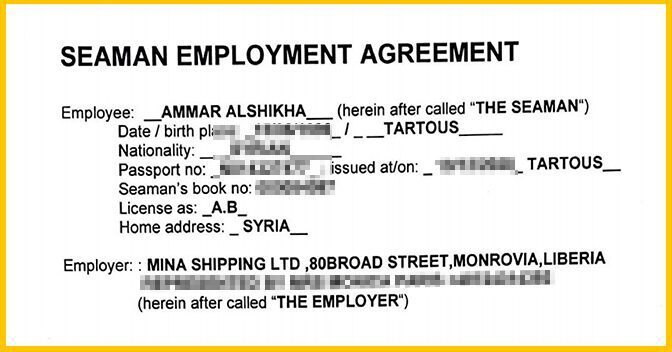

Image of the employment contract – Source: Sailor Ammar Al-Sheikh.
The investigative team contacted the phone number listed in the company registration in Romania. A woman who answered the call said: “Mina Shipping is an offshore company, and the owner passed away, I don’t know… about two or three years ago, I believe,” she added before closing the phone and ending the call.
Samer Fahl’s Facebook page indicates that he worked in the cargo transportation field in the Romanian city of Constanta. Family posts on Fahl’s Facebook page confirm his death in February 2023.
His social media activity stands out with regular posts of ships that seem to capture his interest. One of these pictures from 2016, featuring the ship Nadelina in Constanta, Romania, and another in 2019 of the same ship in the port of Alexandria, Egypt, drew particular attention.


“Our ship Nadelina, here are its pictures after maintenance in Constanta in October 2016,” reads the Facebook post.
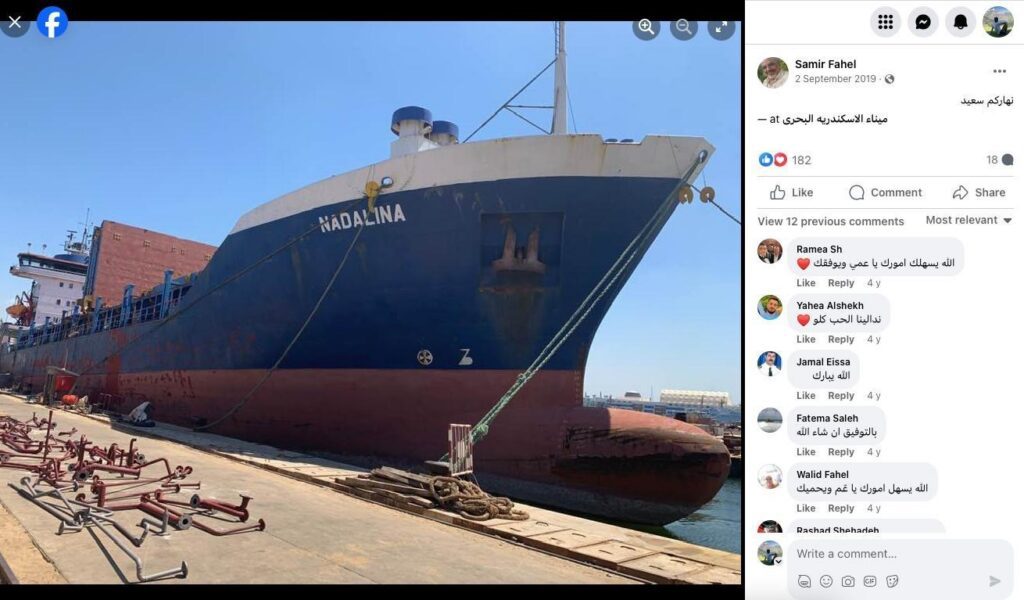

A post of the ship Nadelina shared by Fahl from the port of Alexandria, Egypt, in 2019.
The investigative team used the ship’s Identification Number (IMO) to search for the vessel, discovering that Nadelina and East Express share the same IMO number. The ship had changed its name more than 8 times in its professional history, with three changes in the last four years alone.
Considering that changing ship names, registration locations, and administrations is common in the maritime shipping industry, further investigation was conducted to understand its history before its abandonment in 2022 and to identify patterns in name changes and registrations as a way to alter ship owners’ practices and management companies.
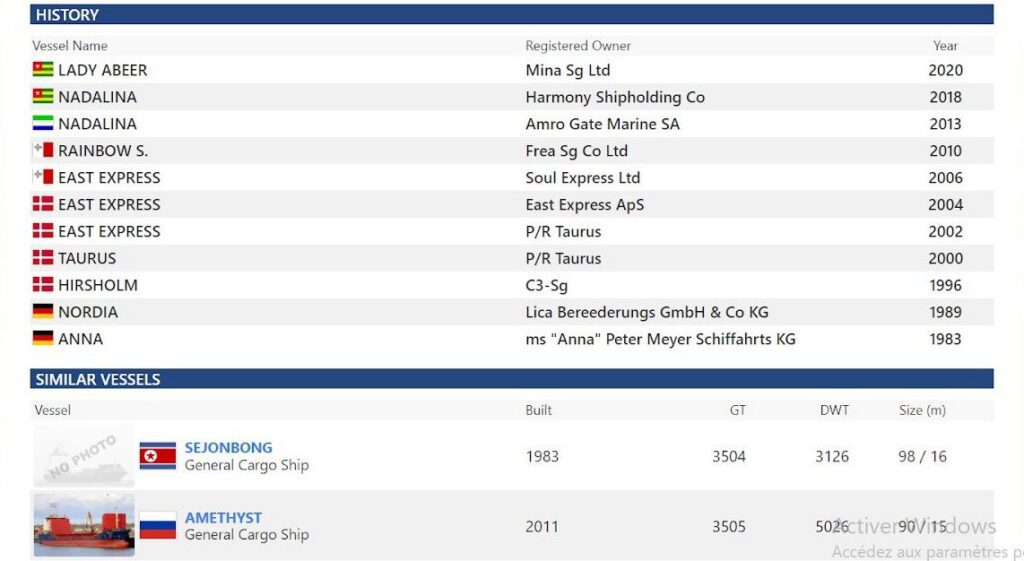

Previous names of the ship during its professional career.
Escaping Sanctions
Different types of ships must share their coordinates through the Automatic Identification System (AIS) for safety purposes. Publicly accessible websites like MarineTraffic are then used for information on the ship, to then determine its location at sea.
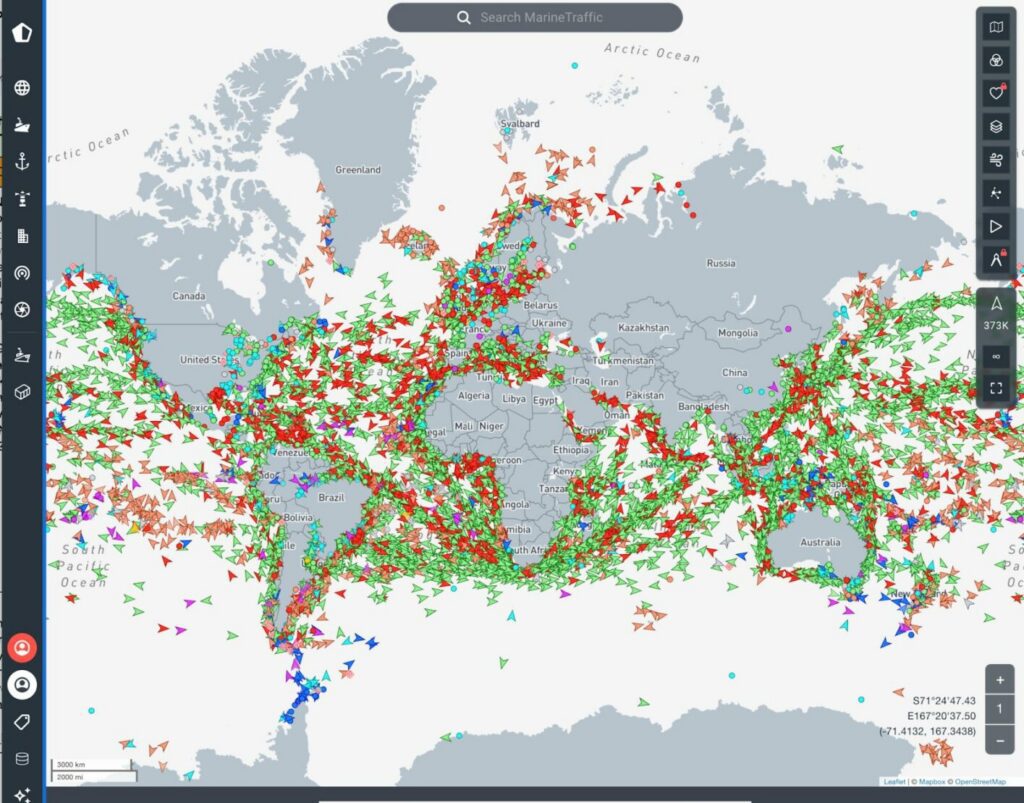

Screenshot of ships and carriers on MarineTraffic website.
The investigation team relied on 2920 location data points sent by the East Express (formerly Nadelina) to MarineTraffic over eight years (365 x 8 = 2920) to track its movements between 2016 and 2023.
The data, detailing the ship’s daily movement, showed East Express conducting regular trips across the Mediterranean and Black Seas to Turkey, Tunisia, Libya, the Syrian port of Tartous, and Constanta port in Romania, along with trips to the closed Crimean peninsula ports.
Automatic Identification System (AIS) tracking was frequently disabled until it was eventually abandoned.
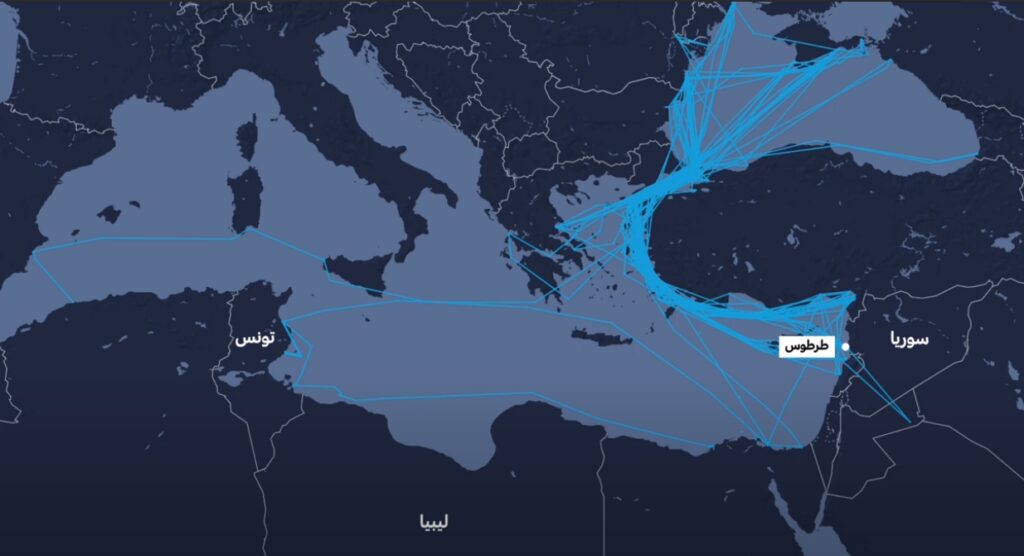

The route of Nadelina in the Mediterranean between 2015 and 2023, where it used to go to the Syrian port of Tartous.
Russia annexed the Crimean peninsula in 2014, a move considered unlawful by Ukraine. Following this, the United States and the European Union imposed sanctions prohibiting international vessels from docking in Crimean ports.
Initially, it was challenging to find the true owner of the ship, as shell companies aim to register the ship under the company’s name without specific activities or a real address.
Kateryna Yaresko, a digital investigator working for the Sea Krime project affiliated with Myrot Vorets, extensively researched Nadelina’s activities. She and her colleagues obtained pictures of the vessel docking in closed Crimean ports, where it was being loaded with shipments of scrap metal or grains.
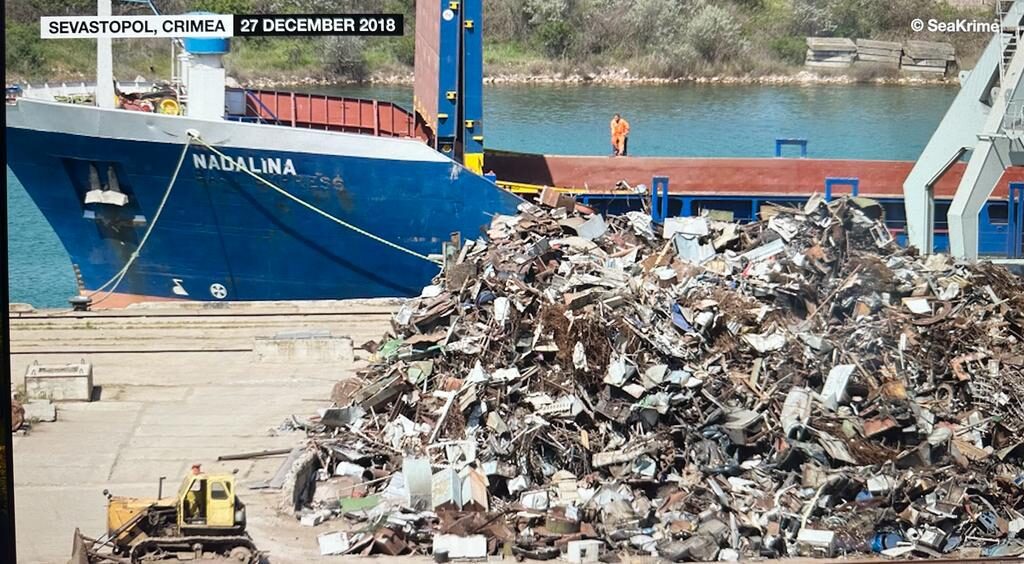

Nadelina ship docking at one of the ports of the Crimean peninsula on December 24, 2017. Source: SeaKrime
Yaresko told the investigative team that the Nadelina was owned by Romanian businessmen of Syrian origin and violated restrictions imposed on European ships, along with a group of other ships, all owned by Bia Shipping Co.
According to the independent investigative news agency Black Sea News in Ukraine, the Nadelina was part of a group of ships managed by Bia Shipping Co.
The Romanian government was aware of the activities of the Nadelina. The Romanian Ministry of Foreign Affairs informed the investigative team that they had investigated the repeated visits of the Nadelina to Crimea, but there was not enough evidence to prove a sanctions violation. Instead, they “issued a warning to the ship operators about the risks of sanctions violations.”
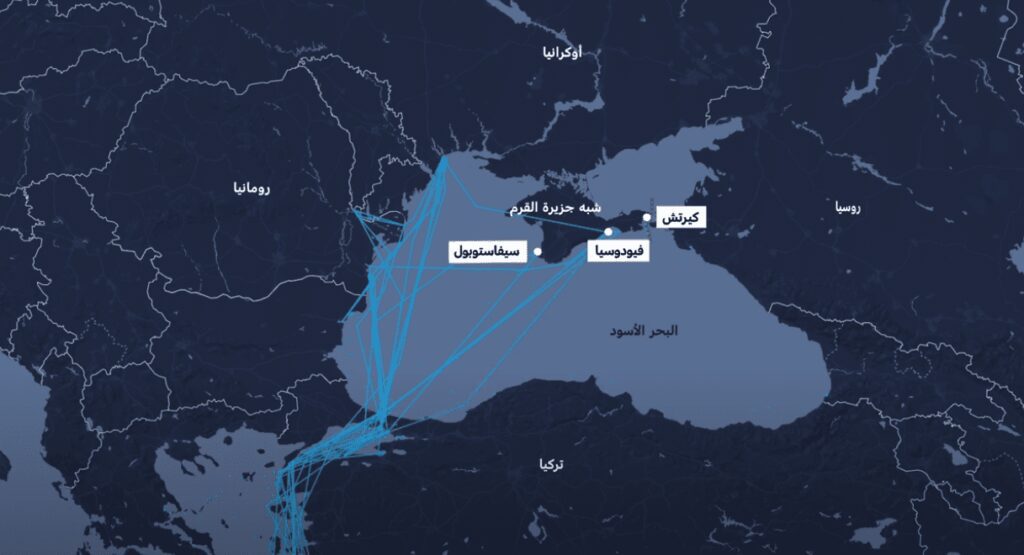

The route of Nadelina in the Black Sea between 2015 and 2023, where it used to go to closed ports on the Crimean peninsula.
Who is Behind Bia Shipping?
International ship registration records from the Sea Web maritime coverage website for the year 2015, obtained by the investigative team, showed the connection of Bia Shipping through contact information published on a website with the address joharshipping.ro. It was revealed that Bia Shipping regularly worked and operated with partner companies called Johar and Co. Marine,Johar Group, and Johar Rima Marine.
Contact information for Bia Shipping Company via the joharshipping.ro website – Source: Sea Web
As the joharshipping.ro website is no longer available online, the team managed to retrieve old copies from the web archive using Wayback Machine, an archiving tool. It also showed that Johar Shipping owned five ships, including the same ships owned by Bia Shipping, such as the ships Georgiana H, Rania H, Johar H, Anda, and Adnan H.
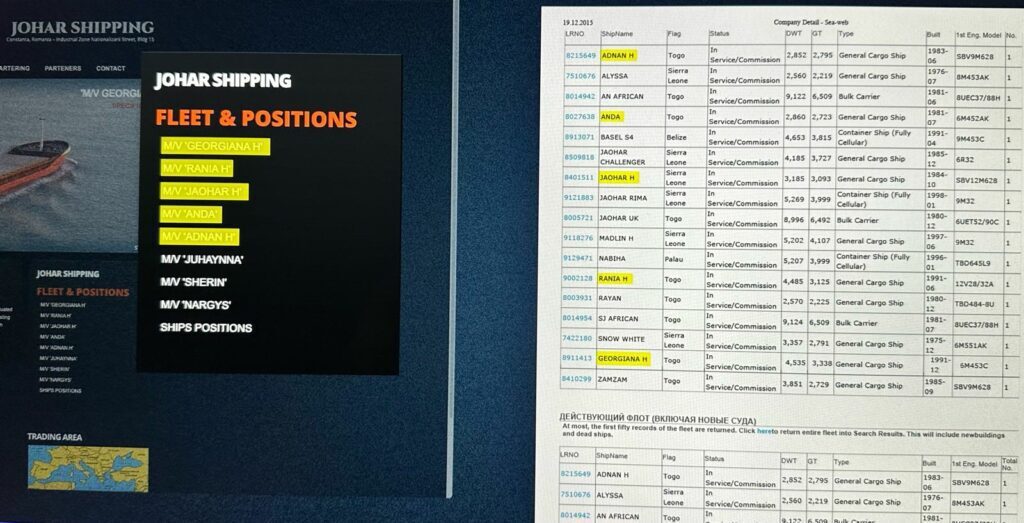

The five ships owned by both Bia Shipping and Johar Shipping
The archive displayed the name of a man called Adnan Hassan, presented as the administrative director, and another person named Johar Hassan as responsible for general operations.
Later, both Adnan Hassan and Johar Hassan relinquished their shares in Johar Shipping in 2020, according to information and documents obtained by the team in Romania.
Pages on Facebook show pictures of Hassan aboard a yacht measuring 18 meters, dining and fishing with Johar Hassan, as well as pictures on Facebook with Samer Fahl, who we were told, by the crew of the East Express ship, that he owns the ship through Mina Shipping.
In the course of our research while working on this investigation to obtain answers from ship owners, we attempted to contact the three individuals and their companies, using all the contact information and social media accounts we found.
A member of Samer Fahl’s family informed the investigative team that the family is still responsible for the East Express after his death. They promised to conduct an interview with us but never responded to any subsequent calls.
In an interview with the investigative team, Adnan Hassan confirmed that the deceased businessman Samer Fahl was the owner of the East Express. He stated that he was only an agent for the ship when it was named Nadelina and was unaware that Crimean ports were subject to sanctions.
He emphasized that after Fahl’s death, he agreed to help the family as a friend. He said, “I wanted to help the family, to help them release the ship. But I found that it had more debts than its value.”
“I told the crew that I would pay their dues as assistance only if the ship left the port,” Hassan added.
Who Helps the Sailors?
As hope fades and challenges mount for abandoned sailors, their conditions deteriorate rapidly aboard dilapidated ships, leaving them in a predicament threatening the sinking of their vessels, the waste of their money, and their lives.
Seafarer Ammar said: “The crew members have not received their salaries in 12 months (last paid in January 2023), and they believe that staying on board the ship is the only way to get their money.”
After the team contacted the International Transport Workers’ Federation (ITF) to inquire about the fate of these sailors, Sheikhah informed us the next day that the federation had agreed to send him some money to buy airline tickets to Syria.
“Glory to God, I have a lump in my heart. After two years of hardship, I return to my family, my wife, and children without any salary,” Sheikhah said in a recorded message he sent from the airport as he was about to board the plane.
While Ammar gave up all his rights, returning to his homeland and family, seven of his colleagues remain abandoned on the ship, waiting for a solution and intervention to return them to their homelands.
This investigation was published in collaboration between the Syrian Unit for Investigative Journalism – Siraj, and the Observers program (France 24), in English and French. The Arabic version was published on the Daraj and Siraj websites.





